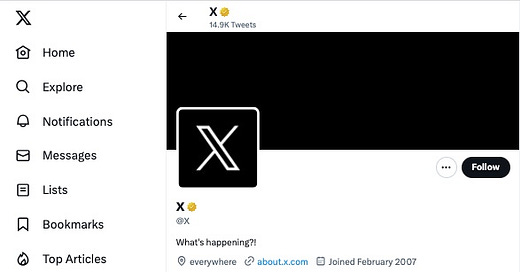Rabbit Hole: Elon Musk's eXtremely Disappointing First Year Running Twitter
Better than before, but a low bar... and not giving up on it yet
Rabbit Hole” is a single-topic deep dive column that comes out twice per month for paid subscribers. The free newsletter returns later this week.
You won’t be able to read this column on Twitter.
Sorry, it’s called “X” now as of last month, and technically I can tweet a link to this post and you can read it — but having a link to this story in a tweet (or whatever we’re calling them now) will cause it to be artificially suppressed so much it will be practically invisible.
This is just one, admittedly personal, gripe. But the truth is, Elon Musk’s tenure running one of the biggest social media platforms in the world has been a bizarre mix of own goals and counterproductive decision-making, where the business side always seems to win out over the free speech instincts he conceivably holds dear.
I’m not an Elon Musk hater. In fact, I may be one of the earliest people ever to suggest the genius behind Tesla and SpaceX should purchase Twitter in the first place, in a tweet on January 8, 2021, and in the former iteration of the Fourth Watch newsletter two days later. Don’t “start your own Twitter,” I urged freedom-minded founders. “The better solution is to install more American values at these existing companies through a power shift,” I wrote. “Which is why Elon Musk should buy Twitter.”
It’s also worth making very clear that I am far from the camp which can easily be described as suffering from “Musk Derangement Syndrome,” like CNN’s JV media correspondent who runs their shell of a newsletter now, who wrote a couple weeks ago about Twitter, now X: “A warped and disfigured platform, X marches on like a White Walker, an ugly shell of its former self under the command of a loathsome leader." (Truly psychopathic editorializing, and sophomoric writing.) There are others, like Kara Swisher, who performatively hate Musk now as a means of atonement for her past glowing coverage of the billionaire, the way people like Katie Couric or Gayle King surely hate Donald Trump after having been to his wedding in 2005.
But there’s no getting around the fact that the promise of a truly open platform, free of an unfair algorithm, fuzzy and arbitrarily applied rules — these have not panned out in a substantial way. You can tweet “men aren’t women” now. Sure. But it is those of us who cheered for Elon Musk to take the reins of the platform most responsible for the outrageous Hunter Biden laptop suppression in 2020 who must call it out when there are broken promises.
And that does, on some level, get exemplified by Musk’s bizarre feud with Substack. Originally there seemed to be some symbiosis between Musk and prominent Substack journalists. There certainly seemed to be philosophical alignment on the value of a free exchange of ideas, encumbered by as little restriction as possible.
When the Twitter Files were first being reported out, it was Matt Taibbi and Bari Weiss who led the charge, on Twitter, yes, but also on their massive Substack publications. Since then, Musk has had falling outs with each of them.
Another reporter who reported out the Files was Michael Shellenberger. He and Alex Berenson, who both write Substacks that are important to the discourse (
and ) can be found now on Twitter screenshotting their articles, rather than linking to them, to seemingly get around what is a clear artificial suppression of tweets with Substack links. I asked both if they are doing the screenshots for this reason, and if they think it’s a knock against the stated free speech mission of Musk’s Twitter. “Yes and yes,” Berenson told me. “I would rather provide the link. And I wish Elon wouldn’t go after Substack — it’s tiny compared to Twitter and not really a competitor. They serve very different audiences and have very different strengths.”That’s 100% true. And while Musk can claim it’s a business decision (he doesn’t like Substack doing the Twitter competitor “notes,” and he wants Substack’ers to write long tweets instead), that doesn’t change the fact that it mirrors a policy of shadowbans and blacklists that Musk and his supporters decried under the old regime. (Shellenberger didn’t respond.)
But it also goes beyond just the way he’s dealt with Substack — and a lot of it comes down to 8 bucks a month.




